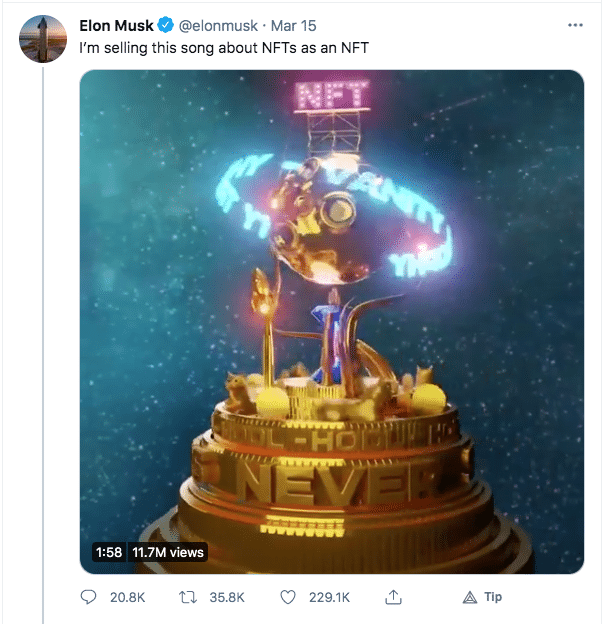PLUS: More takes on “WTF is an NFT?”
There is something fitting about Bitcoin crossing $60k for the first time on March 13, 2021, a year and one day after crypto’s “Black Thursday,” when Bitcoin’s price plunged 50% over two days in response to the coronavirus. While devastating at the time, you can now barely see it on the BTC price chart:

Crypto news was spread across several areas this week, including institutional finance, hacks, NFTs, and mining controversies. Coinbase and eToro took steps forward to going public, while Kraken is said to be mulling it. Morgan Stanley announced that a subset of its wealthier clients will now have access to three bitcoin funds. BitMEX founders Arthur Hayes and Ben Delo seem to be honoring their intent to surrender, with the proposed bail reaching $30 million between the two of them. Bitcoin mining and the utility of NFTs continued to garner much debate within the crypto community. There was a notable hack this week at Nifty Gateway. And, of course, Elon Musk made headlines by not selling a song about NFTs as an NFT.
On the podcasts, Mason Nystrom of Messari and Jamie Burke of Outlier Ventures gave a deep dive on NFTs — covering topics like NFT valuation, where NFT’s might fit in the futuristic metaverse, and how they will be financialized. And on Unconfirmed, MetaKovan talks about his $69 million purchase of Everdays, with a very “meta” discussion around art, identity, and our digital future.
Listen to the Latest Episode of Unchained
How NFTs Are Revolutionizing How Creators Make MoneyJamie Burke, CEO of Outlier Ventures, and Mason Nystrom, a research analyst at Messari, discuss the NFT craze that has enveloped the crypto world over the past few weeks.
Listen to the Latest Episode of Unconfirmed
MetaKovan on Why He Spent $69 Million on a JpegMetaKovan, the pseudonymous buyer of Beeple’s Everydays NFT and founder of MetaPurse, talks about his recent $69 million purchase.
Thank you to our sponsors!
Download the Crypto.com app and get $25 with the code “Laura”:
https://crypto.onelink.me/J9Lg/unchainedcardearnfeb2021
Square: https://square.com/go/unchained
This Week’s Crypto News…
Crypto Exchanges Race to Go Public
Coinbase filed an amended S-1 with the U.S. Securities and Exchange Commission on Wednesday, disclosing the exchange has registered roughly 115 billion shares of Class A common stock. In preparation for the public listing, which does not yet have a date, Coinbase CEO Brian Armstrong hosted a virtual AMA (ask me anything) over the last three days with the hope that “investors, regardless of affiliation or size, have access to information and have the opportunity to engage with us.”
eToro is set to go public via a special purpose acquisition company (SPAC) with a valuation of approximately $10.4 billion. Betsy Cohen, chair of FinTech Acquisition Corp V., the company behind the SPAC deal, praised eToro as a “social network platform” that will be very helpful for younger investors. eToro has more than 20 million users, projects $1 billion in revenue for 2021, and currently offers 93 cryptocurrencies to its customers.Kraken (which, disclosure, is a previous sponsor of my shows) is also considering going public, though there are conflicting reports on how exactly it would do so. The Block reported that Kraken could go public in the next year via a direct listing. Fox Business Reporter Charles Gasparino tweeted that Kraken execs are considering going public through a SPAC or IPO sometime in 2022. Kraken CEO Jesse Powell recently showed interest in going public, saying, in a February Bloomberg interview, “we are certainly on track, though $10 billion is a low valuation. I wouldn’t be interested in issuing shares at that price.”
Meanwhile, if you’re wondering how well the crypto exchange business is doing, on-chain market analyst Willy Woo posted a chart estimating that 35,000 new Bitcoin users a day are arriving on-chain. He says that means that crypto exchanges are “likely adopting an additional ~100,000 users per day right now.”
In related CeFi news, Binance is being investigated by the CFTC to determine whether the exchange permitted U.S. residents to buy and sell derivatives without registering with the agency first. While the report noted that Binance “hasn’t been accused of wrongdoing,” BNB, the exchange’s token, dropped 6% immediately, though it has since recovered some ground. Binance CEO Changpeng Zhao, or CZ, tweeted a response calling the report “FUD” and encouraging customers to keep “BUIDLing.”
Morgan Stanley to Offer Clients Access to Bitcoin Funds
Morgan Stanley is partnering with NYDIG and Galaxy Digital to become the first large U.S. bank to offer clients access to bitcoin funds. CNBC reports that the move was announced through an internal memo to its financial advisors, directly responding to client demand for bitcoin exposure. The offering comes with a few caveats, however. Customers must have at least $2 million in assets held by the investment bank. Morgan Stanley is also limiting bitcoin investments to a maximum of 2.5% of their total net worth. Two of the funds will be offered through Mike Novogratz’s Galaxy Digital. The third is a joint offering from asset manager FS Investments and NYDIG, the bitcoin subsidiary to Stone Ridge.
Morgan Stanley was not the only bank to make a crypto move this week. Bank of New York Mellon, amongst others, is investing in Fireblocks, a crypto-custodian startup. The Series C round raised $133 million.
Additionally, the SEC acknowledged VanEck’s bitcoin ETF application on Monday. The SEC now has a 45-day window to make a decision on the proposal, although they can extend the review period up to 240 days to make a final decision. If approved, the bitcoin ETF would be the first product of its kind in the United States.
BitMEX Founders Begin the Process of Surrender
According to The Block, Arthur Hayes, former CEO of BitMEX, plans to surrender to authorities as early as next month, with a proposed $10 million bail. He will fly to Hawaii on April 6th from his current residence in Singapore and has proposed to continue residing in Singapore with pre-approved travel to New York as part of his bail conditions.
Co-founder Ben Delo surrendered to U.S. authorities on Monday, where he was subsequently released on a $20 million bail.
Concerns About Bitcoin’s Climate Impact Grows
Andrew Ross Sorkin of The New York Times wrote an article on Bitcoin’s carbon footprint that began with a Bill Gates quote from a February interview: “Bitcoin uses more electricity per transaction than any other method known to mankind, and so it’s not a great climate thing.” It also mentions a Cambridge University study that calculates the annual carbon emissions of Bitcoin to be equal to New Zealand (or Argentina). However, he notes the Norwegian energy company Aker’s bitcoin spinoff, Seetee, is working on using renewables to power Bitcoin mining.
A tweet thread from Mustafa Yilham (@MustafaYilham), vice president of global business development at Bitcoin miner Bixin, explained that a Bitcoin miner’s primary goal is to “use [the] cheapest electricity rate available, but it just happens to be that renewable energy (Hydropower) and other excessive/waste energy (similar to flare gas) are cheapest.” In China, he explains, miners migrate to different regions based on the season to be able to use 100% renewable energy during rainy summers when areas like SiChuan produce excess hydro-power. Mustafa estimates that miners in Siberia, Iceland, and Sweden are probably close to 100% renewable.
In case you missed it, we covered this topic on last Friday’s podcast with Brendan McGill, co-founder of Offsetra and Carbon.fyi, who said that Offsetra estimates that 70% of PoW mining is performed using fossil fuels.
Some Nifty Gateway Users Hacked While NFTs Generate Debate
A small group of Nifty Gateway users were recently hacked. The account takeovers targeted customers without two-factor authentication, which is not currently mandatory on Nifty Gateway. The popular non-fungible token platform returned some of the stolen art to its customers as the hacker failed to move the NFTs off of Nifty Gateway’s platform, where the company controls the private keys. The lessons here are 1) securing cryptographic wallets and keys should be a priority. 2-factor authentication is almost always a good idea. 2) if you don’t own the keys to your wallet, you don’t own the NFT or any tokens associated with that address.
Meanwhile, the debate over what exactly gives NFTs value continued. Nic Carter, partner at Castle Island Ventures, wrote in a post that NFT’s are neither “God’s Gift” nor “doomed or bound to crash.” He describes NFTs as a “wrapper” for content that is misconstrued as a product rather than a process. Carter is most intrigued by an NFT’s ability to tightly link IP and digital content from creator to consumer, as well as the assurances of exclusivity that come with the minting process. Jimmy Song, a Bitcoin educator and developer, wrote that NFTs are a bubble “ripe for popping,” much like how ICO’s came and went. He points to low liquidity, fraudulent/stolen artwork, and demand limited to ETH holders as reasons “NFTs are doomed to crash.” A recent CoinDesk column by Ajit Tripathi, the head of institutional business at Aave, argued that NFTs aren’t just one thing, but will have multiple impacts: they will create digitally native token markets for off-chain assets, bring non-technical people into crypto through art and digital collectibles, and force legal frameworks to align on-chain and off-chain rights.
Vlad Zamfir Sues CasperLabs for Misappropriating His Name
Vlad Zamfir, a blockchain researcher formerly of the Ethereum Foundation, filed a complaint with the U.S. Southern District of California court against CasperLabs on Wednesday, claiming CasperLabs is using the name “Casper” without his express consent. CBC Casper is the name of his branch of proof-of-stake research, which he began in conjunction with Ethereum founder Vitalik Buterin in 2014 (Vitalik’s research on the topic is now called Ethereum 2.0.). Along with branding many products under the name Casper, Zamfir alleges that CasperLabs has attempted to obtain ownership of the Casper trademark, which he says is almost exclusively used in reference to Mr. Zamfir’s PoS research.
Bitclout Garners Suspicion
A new decentralized protocol named Bitclout garnered derision and outrage on Crypto Twitter this week. The platform allows users to speculate on people and posts with real money. Every profile on the platform receives its own “creator coin” that can be bought and sold. The idea is to allow people to invest in profiles they assume will become popular — to basically invest in clout.
Larry Cermak, director of research at The Block, tweeted on Wednesday that “the Bitclout scheme has so far been able to raise 2705 BTC, which is ~$155 million,” before warning users to “stay away from this garbage.”
Elon Musk Teases With a Song About NFTs
In a fourth-wall breaking tweet, Elon Musk announced that he would be “selling [a] song about NFTs as an NFT.” While he later decided to pass on the actual sale, where he had an offer $1million +, I still think the entire tweet is worth a view/listen:

I could write more about Elon and Tesla’s Bitcoin purchase and his weird affinity for Doge… but I think Beeple might have had the best response:

The Onion Publishes an Informative Guide to NFTs
I highly recommend reading The Onion’s Guide to NFTs, which in some respects doesn’t seem like satire at all … One highlight:
Q: Isn’t their value completely made up?
A: There’s something you should know about money in general…


